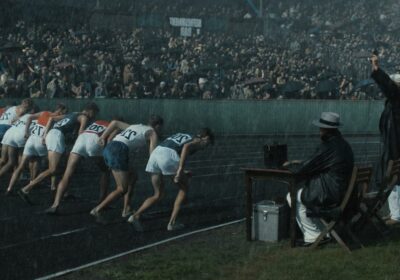David Ondricek on the Long Road to Olympic Champion Biopic ‘Zatopek’

David Ondricek’s epic account of Olympic gold medalist and multiple record holder Emil Zatopek, who attained legendary status in the darkest days of the Czechoslovak communist regime, makes for a powerful opening film at this year’s Karlovy Vary Film Festival.
The director of “Whisper” and “In the Shadow,” who co-wrote the biopic with Alice Nellis and Jan P. Muchow, says the ambitious shoot, with detailed period depictions of five Olympic competitions for the star runner and the role of his gold medalist wife Dana, took 14 years to materialize and presented the challenge of capturing the gut-wrenching conflicts of a champion’s life under a system that forced upon him the role of socialist success symbol.
What was it about the life of Zatopek that drove your ideas while developing this story and how did you feel you finally found a way to crack the story?
It’s nearly impossible to make such a demanding period film in the Czech Republic. Even after the success of my previous projects, it was still a grueling process to convince investors and grant commissions that making a biopic about one of the world’s most famous athletes made sense.
I made a feature-length documentary about Zatopek and I met a lot of his friends and competitors in my own country and in Finland. I also spent quite a bit of time with his wife Dana Zatopkova. I saw people cry as they recalled the amazing Emil Zatopek. For the script, there wasn’t a specific moment that we felt we’d cracked the story. In fact, we kept on making significant changes even during filming, particularly with Vaclav Neuzil and Martha Issova, who portray Emil and Dana Zatopek.
What kinds of physical demands did the film put on Neuzil and what was your process of working with him?
The athletic training that Vaclav went through was extremely demanding. During the first phase he even collapsed and had to take a break for several months. He worked on his physical condition for about three years under the supervision of professional coach Jan Pernica, who also appears in the film. Vaclav’s body changed completely during that time and his running technique improved profoundly. But Zatopek had a very unique style of running, especially when it came to his upper body and face. He was kind of spasmodic. That part Vaclav learned just before the shoot.
Did he bring anything to the interpretation of Zatopek that surprised you?
I was surprised by his tenacity and how far he went with the training. He worked very hard physically and, at the same time, managed to read perhaps everything that was ever written about Zatopek. He even got his hands on Zatopek’s private letters and was constantly listening to old recordings of his voice in order to get the exact tone and Moravian accent right.
Did you feel Dana Zatopkova’s role in her husband’s success was a story that had not yet been fully dealt with?
Some viewers who have seen the film say it should be called Emil and Dana. Their relationship is the pivotal theme. The highlight of the film is the marathon at the 1952 Olympic Games in Helsinki, which Emil basically runs to keep Dana. Martha Issova, who plays Dana, met her several times and they became friends. The first time I saw her on the set, I felt like it really was a young Dana Zatopkova standing there.
What was the most difficult dilemma for you to put on the screen about Zatopek’s life?
Emil’s relationship with Dana. Officially, it was a relationship between two athletes who loved and supported each other for the rest of their lives. As I worked my way through their lives, all sorts of questions and topics started popping up. One of the most important was why didn’t they have children? But also, what was life like for Dana in Zatopek’s shadow? Were they really together all their lives? There were a number of such difficult questions.
You’ve said you sometimes feel you’re in the shadow of your father, the twice Oscar-nominated cinematographer for Milos Forman who filmed “Amadeus.” What do you think your dad would say on seeing “Zatopek”?
It’s almost impossible to say. But I was lucky enough to be able to consult on the script with my dad. He even gave me some visual ideas that are there in the film. “Zatopek” is a film full of emotion and my dad loved that, so I’m sure I would have received his praise for it and I miss his tender words.
The Olympic Games sequences are appropriately epic in scale while also keeping up the Cold War look – how did you go about shooting them?
The film features all five of Zatopek’s Olympic runs. I wanted each one to be different and to not bore the audience, for them to be transported to the atmosphere of the late ‘40s and early ‘50s. Cinematographer Stepan Kucera and I conceived of each race as a story.
What do you think is the lesson of Zatopek’s life for Czechs today who have so much more freedom in reaching their dreams?
We can learn a lot from Zatopek’s life. It teaches us something that you people from Western countries have known for a long time already: If you go after something with purpose and honest hard work, you can really achieve it. And then, equally importantly, we must never again allow a time in which people have to decide between sacrificing their freedom, family, and careers and cooperating with a dictatorship.
Source: Read Full Article